#queer language
Explore tagged Tumblr posts
Text
okay so I added this to the FAQ recently but I wanted to make it its own post bc it's important.
------------------------------
I'm [insert queer identity] can I call myself a fag/dyke?
yes.
But I'm nervous because [identity related nuance or specifics].
Still yes.
Can I call myself a tranny?
Look, you can call yourself whatever you want if you feel it fits you. I don't actually care that much nor do I have the authority to grant you a faggot pass or whatever. You can do whatever you want forever and you need no one's permission. I love you be free
#not a heritage post#the fairy rambles#queer language#kind of#in a general sort of senss#I hope this doesn't read as dismissive I mean it with all the love in our heart
510 notes
·
View notes
Text
Alright I'm out of better ideas so it's time to ask tumblr, does anybody have an unabridged copy of The Language of Homosexuality: an American Glossary by Gershon Legman, 1941? So far I've tried:
-Google Scholar -My general science mentor -all the major science "piracy" websites -The Language and Sexuality Reader (this one has the abridged version) -Two linguists -4 library assistants -1 regular librarian -2 research librarians
and I've found nothing, but this is a foundational text of queer linguistics and it's cited EVERYWHERE, so surely there is an unabridged copy of it somewhere???? Please, I've been looking for over a year, someone help me find this paper before I lose my last marble.
#linguistics#science#scientific papers#scientific paper#if I use enough tags then the paper itself will find this post#queer linguistics#queer language#The language of homosexuality: an american glossary#gershon legman#the language of homosexuality: an american glossary (1941) by Gershon Legman
9 notes
·
View notes
Text
Happy Friday!!
Hey everyone! I just wanted to start off by saying this is all new to me, I’m not sure how I’m going to incorporate this blog into my life but I do know… I love to write and express myself and I pretty much have lived 6 soap operas in the 35 years I’ve been alive so get in and buckle up and let’s see where this ride is going to take us!
I’m really looking forward to inviting you all into the finer details of my life, how I became the person I am today and how I continue to overcome the many many hurdles that are thrown my way. I’m going to try and post every day if I can! Thanks for joining in! I look forward to writing for you!!
Mel ❤️
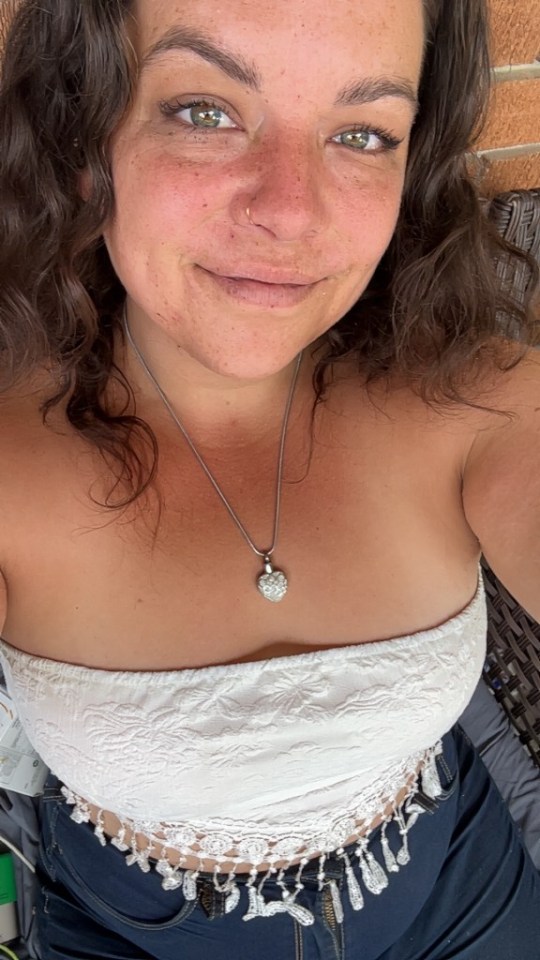
Source: Happy Friday!!
0 notes
Text
Question for nonbinary jumblr:
I’m nonbinary & need a gender neutral alternative to aunt/uncle for my nieces & nephews to call me. I know English has “auncle” & “pibling” but both sound uncomfortable to my ear. My instinct to construct an at least natural-sounding equivalent would be to go back to the etymological root for aunt & uncle to reconstruct a version that isn’t gendered. The problem is, aunt & uncle don’t share an etymological root, so this isn’t really possible.
On the other hand, דודה & דוד in Hebrew clearly do share etymology & seem like they would relatively easy to make gender neutral (besides the obvious that “gender neutral” isn’t how Hebrew typically works lol). However, I’m aware that there’s a project/movement to Queer Hebrew / introduce non-binary gender to it, and I’m curious if anyone knows what would be a way to make דודה / דוד gender-neutral?
#i’d really appreciate it#or if there’s a way of doing the same in yiddish that would also be helpful#jumblr#nonbinary#non-binary hebrew#non-binary jewish#trans jewish#queer jews#hebrew#ישראבלר#yiddish#language#linguistics#queer language
37 notes
·
View notes
Text
Alright lovies on Tumblr a bitch (me) needs some queer and more specifically gender nonconforming language advice. with polish speakers.
Specifically I'm looking for a way to convey nonbinary (or genderfluid or GNC I'm not picky) to an older man from Poland.
Idk if it exists or what so I'm putting this in the void in case it reaches someone who can help.
#polski#queer#queer language#polish language#queer representation#queers#trans#nonbinary#genderfluid
2 notes
·
View notes
Text
The word "folx" confuses me.
As a non-binary person, I completely understand the need for new vocab in order to accommodate ppl like me who don't fit gendered language (for example I prefer "Mx." than "Ms." or "Mr.")
What I don't get is why "folx" was added, because "folk/folks" is already gender neutral? I don't understand.
If anyone has an answer plz let me know bc I'm very confused
10 notes
·
View notes
Text
anyone know any good gender neutral terms in place of girl/boy? specifically that could be used in contexts like "girlfriend" and "boyfriend"?
i was thinking about it and how (imo) "person" or "enby" doesn't really feel the same or have the same energy. like to me they feel as though they would replace man/woman but not boy/girl. and i realised that the reason i think this is, is that "girl" and "boy" are both single syllable words whereas all the seemingly available options for nonbinary people or non specified gender are multiple syllables so they don't fit into the "____friend" format.
the only term i could find was "Xip" however that is something specific to xenogenders and doesn't apply to a wider community.
so does anyone know of, or have any ideas for, single syllable gender neutral terms that could be used in place of "boy/girl" and would fit nicely into the "boy/girlfriend" format and fill that gap in terminology?
#i have thought about this a lot recently#and my 1am deep dive proved ineffective#i just think us enbys deserve to be#included in the _friend convo#rather than the overly formal partner#also don't you just love#when you accidentally delete a post#and have to retype it#lgbtq+#lgbtq#gay#queer#gender queer#enby#non binary#gender neutral#gender neutral language#queer language#lgbt+#lgbt#lgbtqia#xenogenders
7 notes
·
View notes
Text
On top of everything else I feel a certain kind of way about finding out that "tranny" in itself enjoyed a period in very recent history of being spread as positive demedicalized self-id by trans communities first
"The trannies should be able to piss in whatever toilet they want and change their bodies however they want. Why is it my business if some chick has a dick or a guy has a pie? I'm not a trannie or a fag so I don't care, just give 'em the medicine they need."
"This is an LGBT safe space. Of COURSE I fully support individuals who identify as transgender and their right to self-determination! I just think that transitioning is a very serious choice and should be heavily regulated. And there could be a lot of harm in exposing cis children to such topics, so we should be really careful about when it is appropriate to mention trans issues or have too much trans visibility."
One of the above statements is Problematic and the other is slightly annoying. If we disagree on which is which then working together for a better future is going to get really fucking difficult.
274K notes
·
View notes
Note
As a tranny of the tgirl variety who has been previously targeted with the word trap I feel like I may be able to comment on it!
In my experience it's more of like, an offensive and mean thing to say because it's incorrect. Calling a trans girl a trap is like Columbus calling Native Americans Indians. Like, no? I'm not a boy at all and much less one trying to lie to straight men(id sell crypto if I wanted to do that).
And I don't view it as a slur because it's not as reclaimable. I don't call my tgirl friends traps.
But also this is just my perspective :3
thank you for the insight!! the inaccuracy element of it was definitely something that was in the back of my mind but I couldn't really figure out how to phrase it
61 notes
·
View notes
Text
Pride Month Fact 16
If you ever see 2S at the end of LGBT, it's a term we use in Canada (and potentially other parts of North America, I don't know) that stands for "Two-Spirit."
It's an Indigenous term for people who are neither men nor women, both, or who don't consider themselves to be the gender assigned at birth.
This is a culturally closed term, so if you're not Indigenous (I think it's primarily a First Nations and Métis term) then you can't be Two Spirit.
#random facts#did you know#random fact#little known fact#random factoid#random factoids#language#language facts#two spirit#queer community#queer language#indigenous peoples#lgbt#happy pride 🌈#happy pride month#lgbt+#canada#country facts
0 notes
Text








(open pages for better image quality)
the moment I heard elphaba's delivery of "there's a girl i know..." in i'm not that girl i knew i had to draw this comic, i strongly recommend listening to it while you read for the full experience!
this comic is a companion to this piece (which was inspired by glinda's delivery of the same line in the i'm not that girl reprise).
pages 1-4 are from elphie's pov, pages 5-8 are from glinda's.
prints of individual pages: 1 2 3 4 5 6 7 8
flower meanings in order of appearance:


#wicked#gelphie#(girl who has so many thoughts about i'm not that girl)#even jonathan bailey said i'm not that girl is a queer anthem. if nobody gets me i know he does#had to hold myself back from doing an animatic to the entire song (i don't have time)#i don't usually work in b&w so i was a little nervous but i'm really proud of how this comic turned out :')#it was a labor of love of many many weeks drawing this in between work#updated with prints for all 8 individual pages since a few people asked♡#might compile it as a little pdf zine when i have time for anyone who wants to keep it in higher resolution to re-read it#elphaba#glinda#gelphie fanart#wicked fanart#wlw#sapphic#lesbian#wlw art#sapphic art#lesbian art#comic#artists on tumblr#glinda x elphaba#elphaba thropp#glinda upland#galinda upland#i'm not that girl#flower meanings#language of flowers
21K notes
·
View notes
Note
gonna steal that one lol

is there a source u have for saying gay men coined butch as a term? i tried looking it up for curiosity’s sake but i couldn’t find anything. i’m just wonderin, no harm meant.
yep, it stems from a conlang called "polari" that became very popular with gay men in particular:
and changed over time. it saw heavy usage in the 1950's - 70's American queer scene, with cis gay hunks, bears and other macho gays using the term for both themselves and butch lesbians simultaneously
hope that helps somewhat!
955 notes
·
View notes
Text
I have question about modern media.
Why does suddently every name is gender netural instead of unisex?
Is it because of the shift in language and discussions of gender? Is it because it sounds more inclusive? Is it to fill in the "woke quota"? Is there an anwser to it at all?
/ genuen
#/gen#/gen /srs#modern media#queer media#gender neutral post#queer language#lgbtq community#media analysis#please someone anwser i'm interested in the anwser
0 notes
Note
Remind me whether trap counts as a slur?
honestly what is and isnt a slur kind of comes down to its historical weight and the word of the community. I'm not sure whether trap has been around long enough to cement itself as a slur, though it is undoubtedly an offensive term, and one that can be reclaimed. of course, the line between offensive terms and slurs isn't clear-cut, and it's not the sort of thing where one person (or even one system) can determine its status as a slur. As a trans person who's never been on the receiving end of this one in particular, we don't really have strong feelings about it one way or the other.
#not a heritage post#asks#queer language#trap#it's also one of those words that sort of got its start on the internet and online language evolves at lightspeed#which makes these things much harder to measure imo
25 notes
·
View notes
Text
"wait, but what do I say to describe people who cannot get pregnant?" a guide.
Men cannot get pregnant: INCORRECT. Transgender men are men and many are capable of getting pregnant. Also, excludes the plenty of people who are not men who cannot get pregnant.
Cis men cannot get pregnant: INCORRECT. Intersex men who are cis, but have uteruses and ovaries, may be capable of pregnancy, even if it's unlikely. Also, excludes the plenty of people who are not men who cannot get pregnant.
Cis perisex men cannot get pregnant: Correct, but excludes the plenty of people who are not men who cannot get pregnant.
People without uteruses cannot get pregnant: Correct, but excludes infertile and menopausal people with uteruses who also cannot get pregnant.
People who cannot get pregnant: CORRECT. Excludes no one.
To use inclusionary language, you don't need to rip through the reeds in search of wider terminology when you could quite literally say things exactly as they are. Inclusive language isn't "overcomplicated" at all. It's straightforward.
8K notes
·
View notes
Photo
עברית להיות כמו:
אני אסבך בכוונה
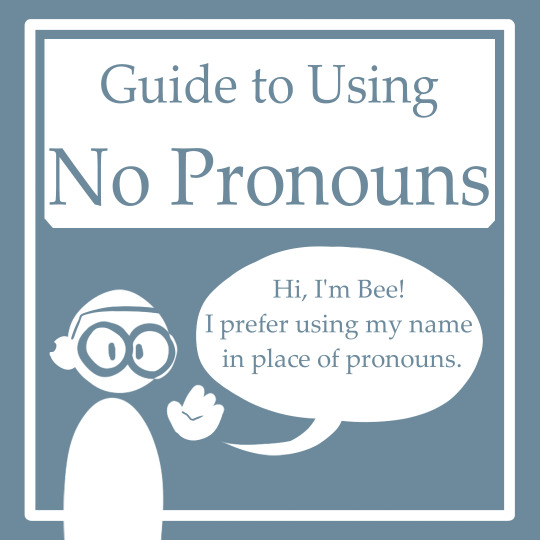

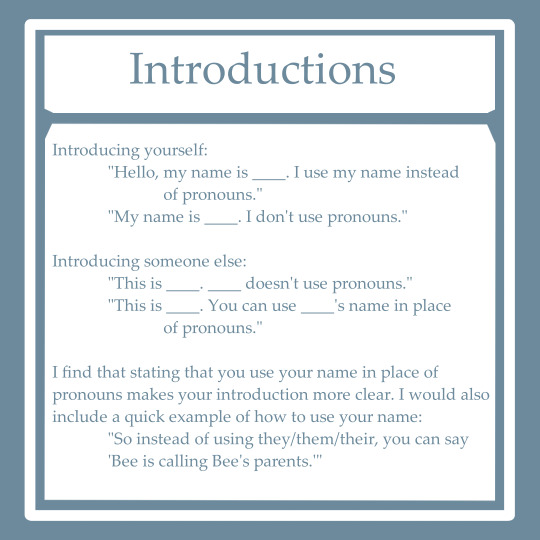
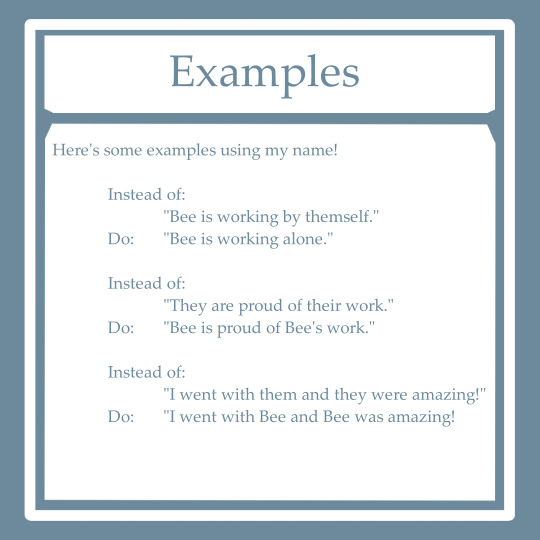
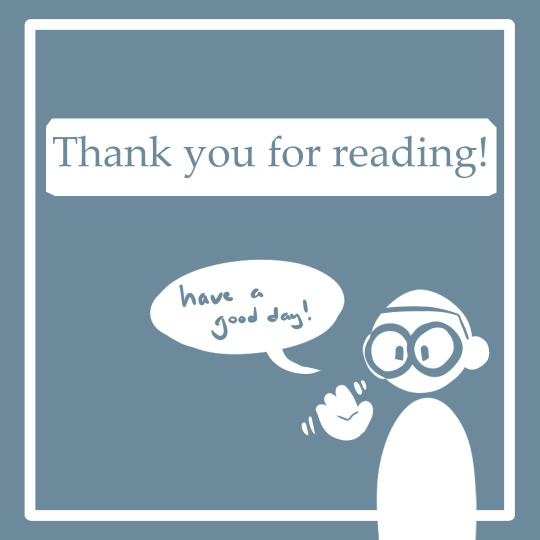
I made this quick info post about using no pronouns bc there’s not a lot of resources on it! Reblogs appreciated :D
[Image ID: Simple blue and white graphic. First slide is titled “Guide to Using No Pronouns” and has a figure waving with a speech bubble that says “Hi, I’m Bee! I prefer using my name in place of pronouns.” The second slide is titled “Reasons to use No Pronouns” and the bullet points read “When no pronouns seem to fit. Sometimes you just don’t vibe with any of them! Avoids misgendering someone who’s not out yet. For fun!” An additional bubble reads “you don’t have to have a reason!” The third slide is titled “Introductions” and reads “Introducing yourself: “Hello, my name is ____. I use my name instead of pronouns.” or “My name is ____. I don’t use pronouns.” Introducing someone else: “This is ____. ____ doesn’t use pronouns.” or “This is ____. You can use ____’s name in place of pronouns.” I find that stating that you use your name in place of pronouns makes your introduction more clear. I would also include a quick example of how to use your name: “So instead of using they/them/their, you can say “Bee is calling Bee’s parents.”““ The fourth slide is titled “Examples” and reads “Here’s some examples using my name! Instead of: “Bee is working by themself.” Do: “Bee is working alone.” Instead of: “They are proud of their work.” Do: “Bee is proud of Bee’s work.” Instead of “I went with them and they were amazing!” Do: “I went with Bee and Bee was amazing!”“ The fifth slide reads “Thank you for reading! Have a good day!”]
Quick FAQ/additional notes under cut:
Keep reading
15K notes
·
View notes
